 Microsoft co-founder Bill Gates overtook Jeff Bezos to become the world’s richest person. Amazon founder and CEO Jeff Bezos lost the title as the world’s richest man to Bill Gates, after losing nearly $7 billion in stock value leaving his net worth to $103.9 billion. Microsoft co-founder Bill Gates is currently worth $105.7 billion. Bezos ended Gates’ 24-year run as the richest man in 2018 and became the first man on earth with a net worth of $160 billion. Bill Gates debuted on Forbes’ first ever billionaire list in 1987 with a net worth of $1.25 billion. Microsoft co-founder Bill Gates overtook Jeff Bezos to become the world’s richest person. Amazon founder and CEO Jeff Bezos lost the title as the world’s richest man to Bill Gates, after losing nearly $7 billion in stock value leaving his net worth to $103.9 billion. Microsoft co-founder Bill Gates is currently worth $105.7 billion. Bezos ended Gates’ 24-year run as the richest man in 2018 and became the first man on earth with a net worth of $160 billion. Bill Gates debuted on Forbes’ first ever billionaire list in 1987 with a net worth of $1.25 billion. |
| Source: The Hindu |
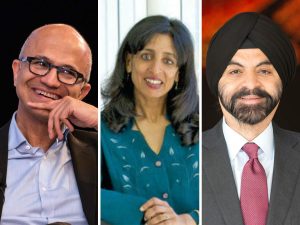 Microsoft’s India-born Chief Executive Officer Satya Nadella has occupied the top spot in Fortune’s Businessperson of the Year 2019 list. The list also includes Mastercard CEO Ajay Banga and Arista head Jayshree Ullal. Banga is ranked 8th, while Ullal comes in at the 18th spot in the list for which Fortune looked at 10 financial factors ranging from a total return to shareholders to return on capital. Both Banga and Ullal are of Indian-origin. Fortune’s annual Businessperson of the Year list features 20 business leaders “who tackled audacious goals, overcame impossible odds, found creative solutions”. Microsoft’s India-born Chief Executive Officer Satya Nadella has occupied the top spot in Fortune’s Businessperson of the Year 2019 list. The list also includes Mastercard CEO Ajay Banga and Arista head Jayshree Ullal. Banga is ranked 8th, while Ullal comes in at the 18th spot in the list for which Fortune looked at 10 financial factors ranging from a total return to shareholders to return on capital. Both Banga and Ullal are of Indian-origin. Fortune’s annual Businessperson of the Year list features 20 business leaders “who tackled audacious goals, overcame impossible odds, found creative solutions”. |
| Source: The Economic Times |
 The International Institute of Management Development’s (IMD) World Talent Ranking (WTR) report for the year 2019 was released. In the released report, India was ranked at 59th position, a slip by 6 places on a global annual list of 63 countries. The list was topped by Switzerland. The top 10 countries that followed Switzerland were Denmark(2nd), Sweden(3rd), Austria(4th), Luxembourg (5th), Norway(6th), Iceland(7th), Finland (8th), Netherlands (9th) and Singapore(10th). The International Institute of Management Development’s (IMD) World Talent Ranking (WTR) report for the year 2019 was released. In the released report, India was ranked at 59th position, a slip by 6 places on a global annual list of 63 countries. The list was topped by Switzerland. The top 10 countries that followed Switzerland were Denmark(2nd), Sweden(3rd), Austria(4th), Luxembourg (5th), Norway(6th), Iceland(7th), Finland (8th), Netherlands (9th) and Singapore(10th). |
| Source: The Business Standard |
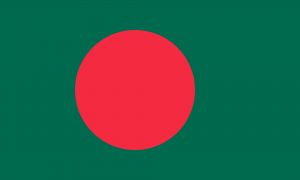 Bangladesh has topped the business bribery risk in South Asia according to the Trace Bribery Matrix. Bangladesh has the highest business bribery risk among South Asian courtiers according to the annual ranking for 200 countries. Bangladesh has been placed at 178th position among 200 countries in terms of business bribery risk. Overall, New Zealand, Norway, Denmark, Sweden, and Finland presented the lowest bribery risk. TRACE is a US-based organisation which provides ranking to various countries in terms of the risk of bribery companies face in doing business in those countries. The Trace Bribery Matrix evaluates the countries under 4 parameters i.e. business interaction with the government, anti-bribery deterrence, transparency and civil society oversight. Bangladesh has topped the business bribery risk in South Asia according to the Trace Bribery Matrix. Bangladesh has the highest business bribery risk among South Asian courtiers according to the annual ranking for 200 countries. Bangladesh has been placed at 178th position among 200 countries in terms of business bribery risk. Overall, New Zealand, Norway, Denmark, Sweden, and Finland presented the lowest bribery risk. TRACE is a US-based organisation which provides ranking to various countries in terms of the risk of bribery companies face in doing business in those countries. The Trace Bribery Matrix evaluates the countries under 4 parameters i.e. business interaction with the government, anti-bribery deterrence, transparency and civil society oversight. |
| Source: The DD News |
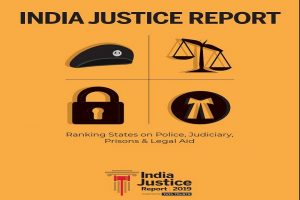 According to ‘India Justice Report 2019’, Maharashtra is the top state in delivering justice to its citizens followed by Kerala, Tamil Nadu, Punjab and Haryana in the first-ever ranking of states on their capacity to deliver justice to citizens. The list of seven small states (population less than one crore each) was topped by Goa, followed by Sikkim and Himachal Pradesh. In this classification, Jharkhand, Bihar and Uttar Pradesh are at the bottom. The ranking is part of the India Justice Report (IJR) 2019, an initiative of Tata Trusts in collaboration with Centre for Social Justice, Common Cause, Commonwealth Human Rights Initiative, DAKSH, TISS- Prayas and Vidhi Centre for Legal Policy. The India Justice Report brings together, in the first such exercise, otherwise soiled statistics, from authoritative government sources, on the four pillars of justice delivery – police, judiciary, prisons and legal aid. According to ‘India Justice Report 2019’, Maharashtra is the top state in delivering justice to its citizens followed by Kerala, Tamil Nadu, Punjab and Haryana in the first-ever ranking of states on their capacity to deliver justice to citizens. The list of seven small states (population less than one crore each) was topped by Goa, followed by Sikkim and Himachal Pradesh. In this classification, Jharkhand, Bihar and Uttar Pradesh are at the bottom. The ranking is part of the India Justice Report (IJR) 2019, an initiative of Tata Trusts in collaboration with Centre for Social Justice, Common Cause, Commonwealth Human Rights Initiative, DAKSH, TISS- Prayas and Vidhi Centre for Legal Policy. The India Justice Report brings together, in the first such exercise, otherwise soiled statistics, from authoritative government sources, on the four pillars of justice delivery – police, judiciary, prisons and legal aid. |
| Source: The Economic Times |
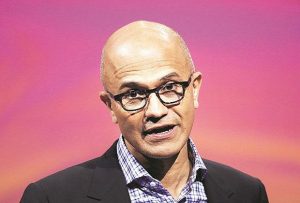 The Best-Performing CEOs in the World, 2019′ list compiled by the Harvard Business Review (HBR) features 100 CEOs. The list has been topped by American technology company NVIDIA’s CEO Jensen Huang. Among the top 10 chief executives on the list, 3 spots have been occupied by the Indian-origin CEOs. Adobe CEO Shantanu Narayen was ranked 6th, followed by MasterCard CEO Ajay Banga was ranked 7th and Microsoft chief Satya Nadella on the 9th spot. The list also features India-born CEO of DBS Bank Piyush Gupta on the 89th spot. Apple CEO Tim Cook was ranked 62nd in the list. The 2019 list has 4 female CEOs in the top 50 of the rankings. The HBR took into account three metrics for each CEO’s tenure: the total shareholder return (including dividends reinvested) adjusted by country and by industry and change in market capitalisation (adjusted for dividends, share issues, and share repurchases), measured in inflation-adjusted USD. The Best-Performing CEOs in the World, 2019′ list compiled by the Harvard Business Review (HBR) features 100 CEOs. The list has been topped by American technology company NVIDIA’s CEO Jensen Huang. Among the top 10 chief executives on the list, 3 spots have been occupied by the Indian-origin CEOs. Adobe CEO Shantanu Narayen was ranked 6th, followed by MasterCard CEO Ajay Banga was ranked 7th and Microsoft chief Satya Nadella on the 9th spot. The list also features India-born CEO of DBS Bank Piyush Gupta on the 89th spot. Apple CEO Tim Cook was ranked 62nd in the list. The 2019 list has 4 female CEOs in the top 50 of the rankings. The HBR took into account three metrics for each CEO’s tenure: the total shareholder return (including dividends reinvested) adjusted by country and by industry and change in market capitalisation (adjusted for dividends, share issues, and share repurchases), measured in inflation-adjusted USD. |
| Source: The Business Standard |
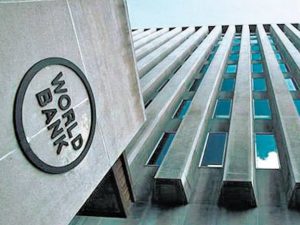 World Bank has released Ease of Doing business Rankings which includes 190 countries. As per the rankings, India has jumped 14 places and has been ranked at 63rd among 190 countries. New Zealand and Somalia retained their 1st and 190th spot respectively. The indicator measures the performance of countries across 10 different dimensions in the 12-month period ending May 1, 2019. From 2020, the World Bank has expanded its ease of doing business survey to 2 more cities: Bengaluru and Kolkata in addition to Delhi and Mumbai that are currently surveyed. The World Bank has decided to have four cities from every country with a population above 100 million. World Bank has released Ease of Doing business Rankings which includes 190 countries. As per the rankings, India has jumped 14 places and has been ranked at 63rd among 190 countries. New Zealand and Somalia retained their 1st and 190th spot respectively. The indicator measures the performance of countries across 10 different dimensions in the 12-month period ending May 1, 2019. From 2020, the World Bank has expanded its ease of doing business survey to 2 more cities: Bengaluru and Kolkata in addition to Delhi and Mumbai that are currently surveyed. The World Bank has decided to have four cities from every country with a population above 100 million. |
Key findings of the Report:
|
| Source: The Hindu |
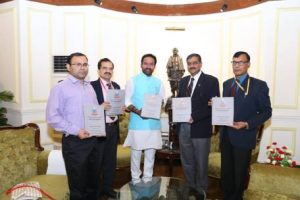 Union Minister of State for Home Affairs G. Kishan Reddy has released the Bureau of Police Research and Development’s flagship publication “Data on Police Organizations” (DoPO 2018) in New Delhi. The Data on Police Organisation in India is an important compilation of information on police infrastructure, manpower and other resources from all States, Union Territories, CAPFs and CPOs. Union Minister of State for Home Affairs G. Kishan Reddy has released the Bureau of Police Research and Development’s flagship publication “Data on Police Organizations” (DoPO 2018) in New Delhi. The Data on Police Organisation in India is an important compilation of information on police infrastructure, manpower and other resources from all States, Union Territories, CAPFs and CPOs. |
Major highlights of the DoPO 2018:
|
| Source: The Press Information Bureau |
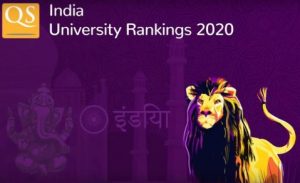 The latest 2 edition of Quacquarelli Symonds (QS) India University Rankings 2020 released. The Indian Institute of Technology Bombay (IITB) has again topped all Indian Institutes in the list with an overall score of 88.5 followed by IISc- Indian Institute of Science, Bangalore (ranked 2 with 84.7 score) & Indian Institute of Technology Delhi (IITD),which has improved a notch to rank 3 with 82.2 scores. The latest 2 edition of Quacquarelli Symonds (QS) India University Rankings 2020 released. The Indian Institute of Technology Bombay (IITB) has again topped all Indian Institutes in the list with an overall score of 88.5 followed by IISc- Indian Institute of Science, Bangalore (ranked 2 with 84.7 score) & Indian Institute of Technology Delhi (IITD),which has improved a notch to rank 3 with 82.2 scores. |
| Source: The Hindustan Times |
 National Crime Records Bureau has released the annual “Crime in India Report 2017”. The report has been released after a delay of 2 years. National Crime Records Bureau has released the annual “Crime in India Report 2017”. The report has been released after a delay of 2 years. |
Key findings of the report are:
|
| Source: The Hindu |
You need to login to perform this action.
You will be redirected in
3 sec
